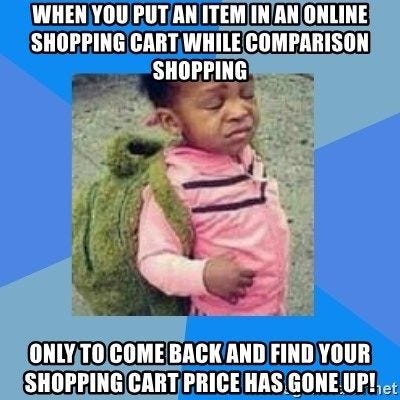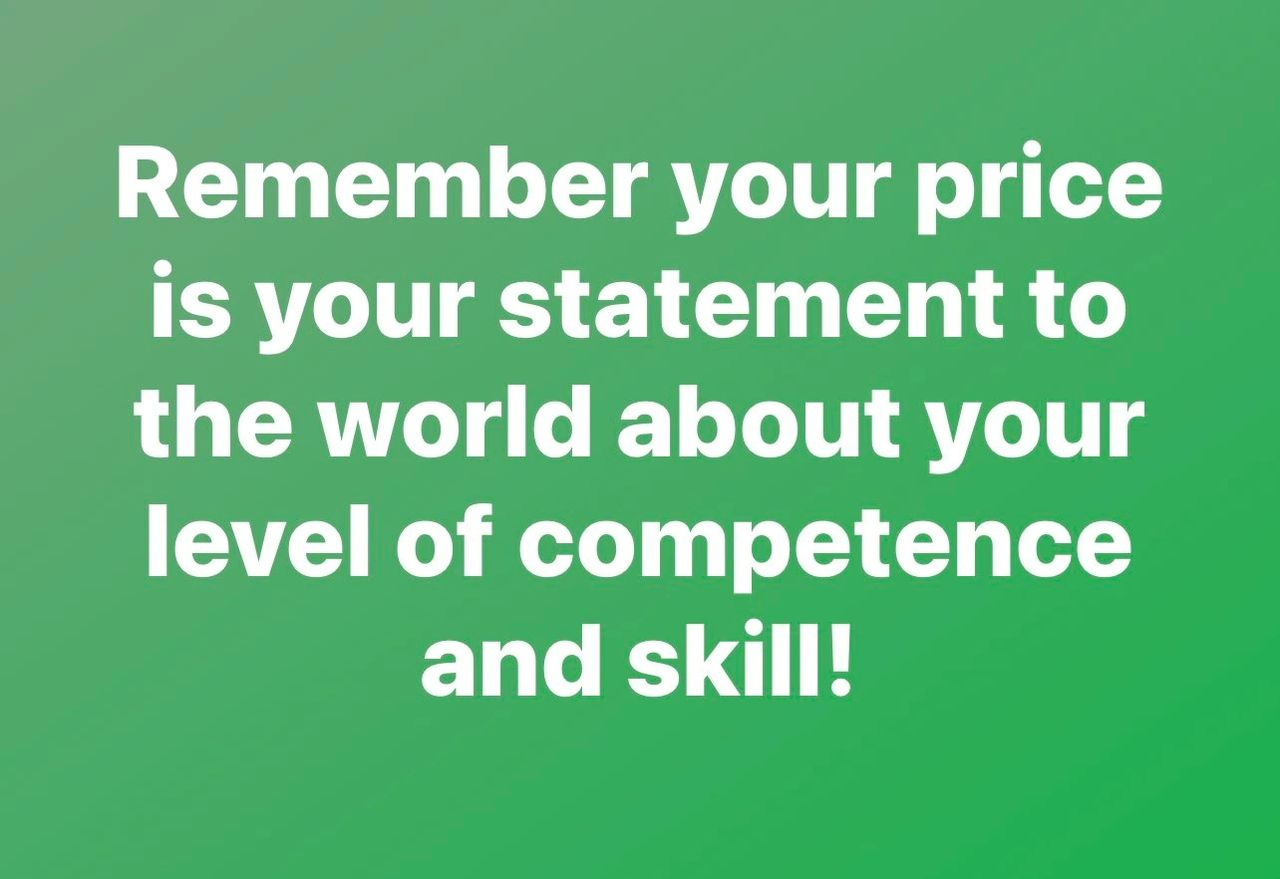What if you didn't have to be?
In my previous post, I wrote about the fear of making sales calls. Whether it's a fear of making an actual phone call, or just a fear of being "pushy," most people don't like to make sales calls, at least not when we're unsure of the outcome.
Another factor causing people to be afraid of selling, especially when they are selling for themselves, is the part where they not only have to make an actual offer, they have to reveal the actual price.
This may be especially scary when you're offering professional services you created yourself or where you yourself are the product and the price can feel very personal and subjective, e.g. music lesson fees, performing fees, or the investment amount for a long-term mentoring package.
Wondering how your fees compare to your friends and colleagues can exacerbate those fears, and it can be even scarier yet if you start to wonder what the buyers can or cannot afford!
With the internet being a boon for comparison shopping and websites like Priceline letting you "name your own price," it's easy to think we have to settle for being among the cheapest, especially if that's how we conduct ourselves while we do our own shopping or make our own spending decisions.
This is one reason business coaching can be immensely helpful when it's time to raise the prices of your services; no matter the level you're trying to move up to, there will always be a personal growth component to the process and you'll have to overcome limiting beliefs standing in the way of you earning more. Hence, I once asked in a tweet, "If raising prices were easy, everyone would just do it, right?"
Publish or Perish?
Publishing your prices is a choice all entrepreneurs have to make from time to time. If your offer is pretty straight forward at a price point people may be used to, or if your marketing and copy is set up so the price makes sense by the time the prospective customers or clients see it, and especially if they can have the ability to click and buy right away, listing your price may make sense—dollars and cents!
Listing the price can also be great if transparency is a major value for your business and you want all of your prospective clients or customers to know upfront what to expect to pay so they can self-select in or self-select out of possibly working with you.
Now, if you haven't noticed, some of my long-term private coaching fees are generally not on my website. Since private business coaching is a service many are not used to paying for, especially if they are not entrepreneurs or they are brand new to entrepreneurship, literally any price I list may simply be too much—or too little!
Though there are some a la carte specials available on my Fons booking link, I’d prefer to at least have a conversation to know if we'd be a good fit working together long term. If what I offer can get them the return on investment they desire, I might be able to help them become resourceful so they actually can afford it, i.e. brainstorm ideas for generating more revenue. I’m also generous with offering graduated payment plans when appropriate.
As my own entrepreneurial journey has lead me to more clarity on who my ideal clients are, e.g. artistic leaders and business owners, I do know the right ones for me wouldn't necessarily be in a comparison shopping mindset like I'm just another pineapple at the grocery store.
How I compare to anyone else wouldn't be the deciding factor for my clients; they will want to hire me for me and the results I can uniquely deliver. (And my clients will be able to say the same for their clients too!)
I also offer multiple tiers of support so there’s usually something someone can afford if they are not literally starving artists and completely destitute. But if the result or the return on investment is worth it, the actual price plays less of a determinative role in the transaction decision.
CONFIDENTIALITY
Confidentiality is a valid reason to consider not listing your prices, especially if it is for a service or offer people are not used to, or if your price might be substantially higher than what people are used to seeing, no matter how reasonable it might actually be when all the results are considered (i.e. an annual tuition price vs. an hourly rate.).
Maintaining confidentiality can be a significant aspect of the service we render for our clients, so publicizing the investment amount or other fees might not always be in their best interest.
In my case, the more I've grown with my coaching work, the more I've attracted clients and prospective clients who have or would have valid reasons for our work or potential work together to not be disclosed, or it would be best to at least keep any actual transaction amounts confidential. Sometimes it's because of a spouse or a family member who wouldn't support the investment, sometimes it's a business partner, client or someone else who just doesn't need to know.
Private business or personal development coaching is a service many are simply not used to and/or they don't understand its transformative value potential. It also doesn't help that a lot of the skepticism about the coaching industry is warranted due to the many spammy promotions, controversial selling tactics, and false promises made by too many expecting to get rich quick by making you think you can get rich quick!
Moreover, when only around 16 percent of the population is considered to be an entrepreneur, as Michael McFall noted in his book Grind, that means there are even far fewer people who would be open to getting or supporting someone else getting specific business coaching services. So no matter your niche, it's important to have immense clarity on who would be in your clients so you can target market effectively.
It can also be about customization
One more thought to consider, which I mentioned above, is that sometimes the price you list might actually be too low for certain prospects. So another very valid reason to consider not listing your prices would be if you have clients or customers who tend to need very unique kinds of help and/or additional customization and support with your offerings.
Some of my own clients only need to meet once or twice a month, others need to meet weekly, some might need to do it all in one day with a VIP Day.
If you want the best of both worlds and you want to list your prices but still maintain room for customization, you could preface your prices with "Starting at..." or include a disclaimer such as "Additional customized support available." Another strategy would be to consider listing an additional "VIP" option without a price and instead give a link to book a discovery call.
There are no wrong answers, and always remember that the more ideal the client, the more ideal of a price they will want pay because you’re all the more worth it!
Lacking confidence in what your price should be?
Try asking yourself these questions I often ask my clients:
What would you like your fees to say about you and the level of service you provide?
What if charging too much no longer needed to be a concern?
What if you allowed your price to simply be a part of your unique positioning?
I once heard a coach say, "Your price is your statement to the world around your competence and skillset."
We have to remember the price isn't really about us. It's really about the value of the offer from the perspective of the people we're serving. The more we are willing to grow in terms of what we can offer and who we are capable of serving, the more we can ultimately charge for the right reasons.
And as long as we're providing value in the life of the person paying that is greater than the value of the cash or its equivalence we're receiving, we can confidently charge practically any amount.
In order to effectively communicate that value proposition, we need to continually work on our skills at facilitating the sales conversation in the right way. It's not about trickery, but like with any product or service, it's about getting clarity on what the prospective client really wants, and clarity on how your offer can help them get what they want.
If there is enough urgency to take action, the most ideal clients will ideally want to become resourceful in coming up with the money to pay your ideal price. This can be true even for people you may be inclined to think can't afford the offer, so part of your job as an entrepreneur and salesperson for what you're offering is to stand in truth of your value no matter what.
If you have any questions or want to further explore your value proposition with what you have to offer, send me a DM!
Thanks for reading.












